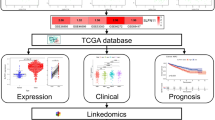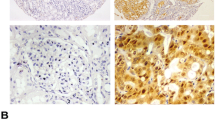Abstract
Various studies have recognized the vital role of the abnormal spindle microtubule assembly (ASPM) gene in the progression of numerous tumors and its association with their poorer clinical outcomes. Nonetheless, the clinical significance and regulatory mechanism of ASPM in papillary renal cell carcinoma (PRCC) have not been illuminated. Herein, we designed a series of experiments to determine the functional significance of ASPM in PRCC. The expression of ASPM was significantly elevated in PRCC tissues and cells, and a higher expression level of ASPM was associated with poor clinical outcomes in patients with PRCC. Following the knockdown of ASPM, the proliferation, invasion, and migration abilities of PRCC cells were all repressed. Moreover, the silencing of ASPM attenuated the expressions of crucial proteins involved in Wnt/β-catenin signaling pathway, including Dvl-2, β-catenin, TCF4, and LEF1. Our study shows the biological significance of ASPM in PRCC and provides new insights for exploring therapeutic targets in PRCC.



Similar content being viewed by others
References
Akhtar M, Al-Bozom IA and Al Hussain T 2019 Papillary renal cell carcinoma (PRCC): An update. Adv. Anat. Pathol. 26 124–132
Bond J, Scott S, Hampshire DJ, et al. 2003 Protein-truncating mutations in ASPM cause variable reduction in brain size. Am. J. Hum. Genet. 73 1170–1177
Brodaczewska KK, Szczylik C, Fiedorowicz M, et al. 2016 Choosing the right cell line for renal cell cancer research. Mol. Cancer 15 83
Bruni D, Angell HK and Galon J 2020 The immune contexture and Immunoscore in cancer prognosis and therapeutic efficacy. Nat. Rev. Cancer 20 662–680
Carril-Ajuria L, Santos M, Roldán-Romero JM, et al. 2019 Prognostic and predictive value of PBRM1 in clear cell renal cell carcinoma. Cancers 12 16
Chen H, Wu J, Lu L, et al. 2020a Identification of hub genes associated with immune infiltration and predict prognosis in hepatocellular carcinoma via bioinformatics approaches. Front. Genet. 11 575762
Chen X, Huang L, Yang Y, et al. 2020b ASPM promotes glioblastoma growth by regulating G1 restriction point progression and Wnt-β-catenin signaling. Aging 12 224–241
Hötker AM, Karlo CA, Di Paolo PL, et al. 2020 Renal cell carcinoma: Associations between tumor imaging features and epidemiological risk factors. Eur. J. Radiol. 129 109096
Higgins J, Midgley C, Bergh AM, et al. 2010 Human ASPM participates in spindle organisation, spindle orientation and cytokinesis. BMC Cell Biol. 11 85
Jia L, Piña-Crespo J and Li Y 2019 Restoring Wnt/β-catenin signaling is a promising therapeutic strategy for Alzheimer's disease. Mol. Brain 12 104
Kim KH, You D, Jeong IG, et al. 2012 Type II papillary histology predicts poor outcome in patients with renal cell carcinoma and vena cava thrombus. BJU Int. 110 E673–E678
Krishnamurthy N and Kurzrock R 2018 Targeting the Wnt/beta-catenin pathway in cancer: Update on effectors and inhibitors. Cancer Treat. Rev. 62 50–60
Kuo WY, Wu CY, Hwu L, et al. 2015 Enhancement of tumor initiation and expression of KCNMA1, MORF4L2 and ASPM genes in the adenocarcinoma of lung xenograft after vorinostat treatment. Oncotarget 6 8663–8675
Lin P, Liang LY, Dong YZ, et al. 2020 Identification of abnormal spindle microtubule assembly as a promising therapeutic target for osteosarcoma. Orthop. Surg. 12 1963–1970
Marchetti B 2018 Wnt/β-catenin signaling pathway governs a full program for dopaminergic neuron survival, neurorescue and regeneration in the MPTP mouse model of Parkinson's disease. Int. J. Mol. Sci. 19 3743
Nusse R and Clevers H 2017 Wnt/β-catenin signaling, disease, and emerging therapeutic modalities. Cell 169 985–999
Petejova N and Martinek A 2016 Renal cell carcinoma: Review of etiology, pathophysiology and risk factors. Biomed. Pap. Med. Fac. Univ. Palacky. Olomouc. Czech. Repub. 160 183–194
Rubinstein MR, Baik JE, Lagana SM, et al. 2019 Fusobacterium nucleatum promotes colorectal cancer by inducing Wnt/β-catenin modulator Annexin A1. EMBO Rep. 20 e47638
Saleeb RM, Plant P, Tawedrous E, et al. 2018 Integrated phenotypic/genotypic analysis of papillary renal cell carcinoma subtypes: identification of prognostic markers, cancer-related pathways, and implications for therapy. Eur. Urol. Focus 4 740–748
Schwarz-Romond T, Fiedler M, Shibata N, et al. 2007 The DIX domain of Dishevelled confers Wnt signaling by dynamic polymerization. Nat. Struct. Mol. Biol. 14 484–492
Selvi I 2021 Comment on ‘Prognostic value of immunological profile based on CD8+ and FoxP3+ T lymphocytes in the peritumoral and intratumoral subsites for renal cell carcinoma’. Int. Urol. Nephrol. 53 1361–1362
Selvi I, Demirci U, Basar H, et al. 2020 The prognostic effect of immunoscore in patients with clear cell renal cell carcinoma: preliminary results. Int. Urol. Nephrol. 52 21–34
Signoretti S, Flaifel A, Chen YB, et al. 2018 Renal cell carcinoma in the era of precision medicine: from molecular pathology to tissue-based biomarkers. J. Clin. Oncol. 36 JCO2018792259
Wang G, Zhang ZJ, Jian WG, et al. 2019 Novel long noncoding RNA OTUD6B-AS1 indicates poor prognosis and inhibits clear cell renal cell carcinoma proliferation via the Wnt/β-catenin signaling pathway. Mol. Cancer 18 15
Wei W, Lv Y, Gan Z, et al. 2019 Identification of key genes involved in the metastasis of clear cell renal cell carcinoma. Oncol. Lett. 17 4321–4328
Wu B, Hu C and Kong L 2021a ASPM combined with KIF11 promotes the malignant progression of hepatocellular carcinoma via the Wnt/β-catenin signaling pathway. Exp. Ther. Med. 22 1154
Wu J, He Z, Zhu Y, et al. 2021b ASPM predicts poor clinical outcome and promotes tumorigenesis for diffuse large B-cell lymphoma. Curr. Cancer Drug Target. 21 80–89
Xia C, Xu X, Ding Y, et al. 2021 Abnormal spindle-like microcephaly-associated protein enhances cell invasion through Wnt/β-catenin-dependent regulation of epithelial-mesenchymal transition in non-small cell lung cancer cells. J. Thorac. Dis. 13 2460–2474
Xie JJ, Zhuo YJ, Zheng Y, et al. 2017 High expression of ASPM correlates with tumor progression and predicts poor outcome in patients with prostate cancer. Int. Urol. Nephrol. 49 817–823
Xu X, Zhang M, Xu F, et al. 2020a Wnt signaling in breast cancer: biological mechanisms, challenges and opportunities. Mol. Cancer 19 165
Xu Y, Wu G, Li J, et al. 2020b Screening and identification of key biomarkers for bladder cancer: a study based on TCGA and GEO data. Biomed Res. Int. 2020 8283401
Xu Z, Zhang Q, Luh F, et al. 2019 Overexpression of the ASPM gene is associated with aggressiveness and poor outcome in bladder cancer. Oncol. Lett. 17 1865–1876
Zhang H, Yang X, Zhu L, et al. 2021 ASPM promotes hepatocellular carcinoma progression by activating Wnt/β-catenin signaling through antagonizing autophagy mediated Dvl2 degradation. FEBS Open Bio. 11 2784–2799
Zhou JW, Wang H, Sun W, et al. 2020 ASPM is a predictor of overall survival and has therapeutic potential in endometrial cancer. Am. J. Transl. Res. 12 1942–1953
Funding
None.
Author information
Authors and Affiliations
Corresponding author
Ethics declarations
Conflict of interest
The authors declare that they have no conflict of interest.
Additional information
Corresponding editor: Shamik Sen
Supplementary Information
Below is the link to the electronic supplementary material.
Rights and permissions
About this article
Cite this article
Li, N., Chu, J., Hu, K. et al. ASPM overexpression enhances cellular proliferation and migration and predicts worse prognosis for papillary renal cell carcinoma. J Biosci 48, 17 (2023). https://doi.org/10.1007/s12038-023-00340-8
Received:
Accepted:
Published:
DOI: https://doi.org/10.1007/s12038-023-00340-8




